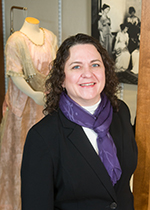April 5, 2013
College of Human Ecology taps Anderson to lead department of apparel, textiles and interior design
Submitted by Communications and Marketing

Barbara Anderson, an authority on historic preservation and sustainability, has been named head of the department of apparel, textiles and interior design at Kansas State University.
Anderson was selected after a nationwide search. She has served as interim head of the department for three years.
An associate professor, Anderson has a Bachelor of Architecture from Kansas State University and a Master of Architecture from the University of Kansas. She has more than 20 years of experience in historic preservation and holds a National Council for Interior Design Qualification certificate.
Her scholarly focus is on sustainability.
"Barbara Anderson has a strong and vitally relevant vision for the way apparel, textiles and interior design education and research shape the future," said Virginia Moxley, dean of the College of Human Ecology. "She understands the power and responsibility we in human ecology have to guide civilization toward a better future and to prepare our students to lead that change."
Kansas State University is a leader in integrating human well-being and sustainability into the disciplines of apparel, textiles and interior design, Anderson said. She plans to strengthen that position in teaching, research and engagement.
To her, that means attending to environmental, social, economic and political issues that are necessary to ensure quality of life. She said some of the most important issues influencing the future of the disciplines represented in the department are environmentalism, global economic inequities and other social justice issues, ethical applications of advances in technology, and trends in human demographics.
"We have the potential to impact those issues because of the discipline we are in. Yes, there are aesthetic concerns of importance to well-being, but we don't stop there," Anderson said.
"We have a responsibility to prepare students to be leaders in shifting the guiding principles to a place where sustainability is broadly understood to be a good business model," she said. "Our graduates need to understand human ecology to make ethical decisions in their work and also in their lives as they help to shape effective, well-functioning communities."
To be change-makers, Anderson said, students need to understand the global situation and that means the department must focus on helping students to be aware of concerns that affect human well-being around the world. The department has been developing international relationships and opportunities for students to have personal international experiences.
"I want our programs to educate students in their disciplines and to have a strong sense of social, political and economic issues around the world," Anderson said. "Too often disciplinary studies lose sight of the connections they have with the tremendous issues facing the world."
Anderson readily cites the department's strengths: a high quality faculty that "is incredibly productive and very engaged in scholarship and teaching," great high-performance students who publish, win competitions and awards and get tapped for top-notch internships and positions after graduation; and a small but hardworking staff.
She's also proud of the department's Historic Costume and Textile Museum and curator Marla Day.
"The museum's primary function is to provide opportunities for scholarship using the artifacts we preserve," Anderson said. "Its secondary function is public education and outreach. It's a good way to connect with the community and with alumni from across the entire university.
"We want to give students exciting reasons to choose K-State over other universities as the place to earn their education in apparel and textiles or interior design," the department head said.
